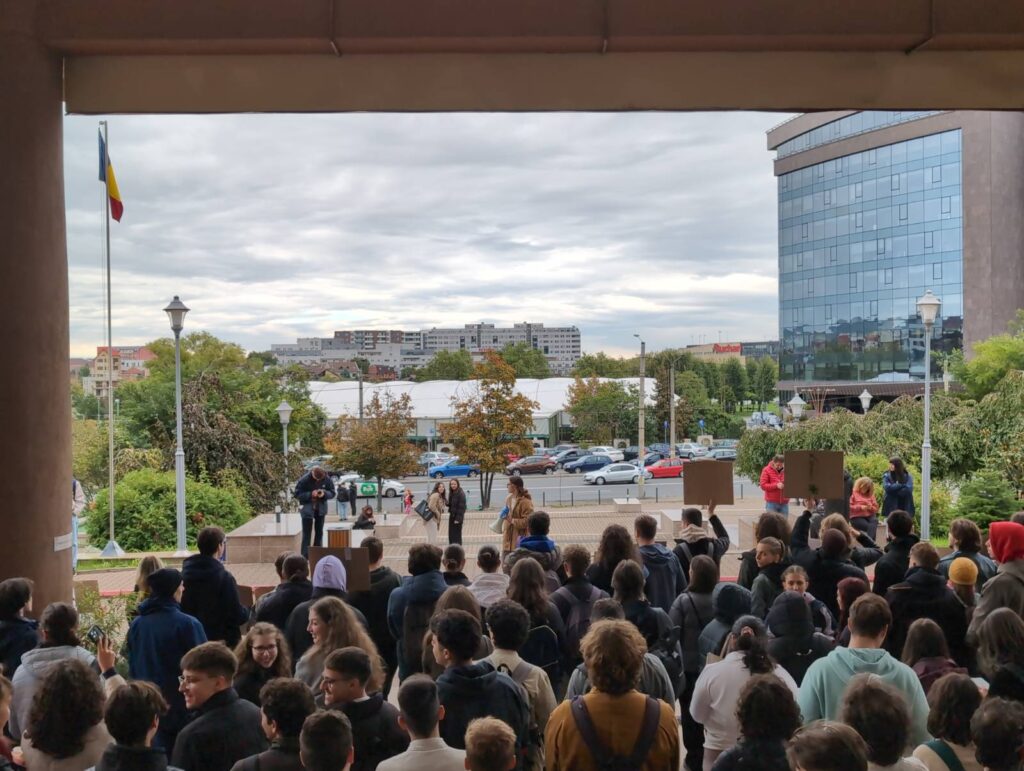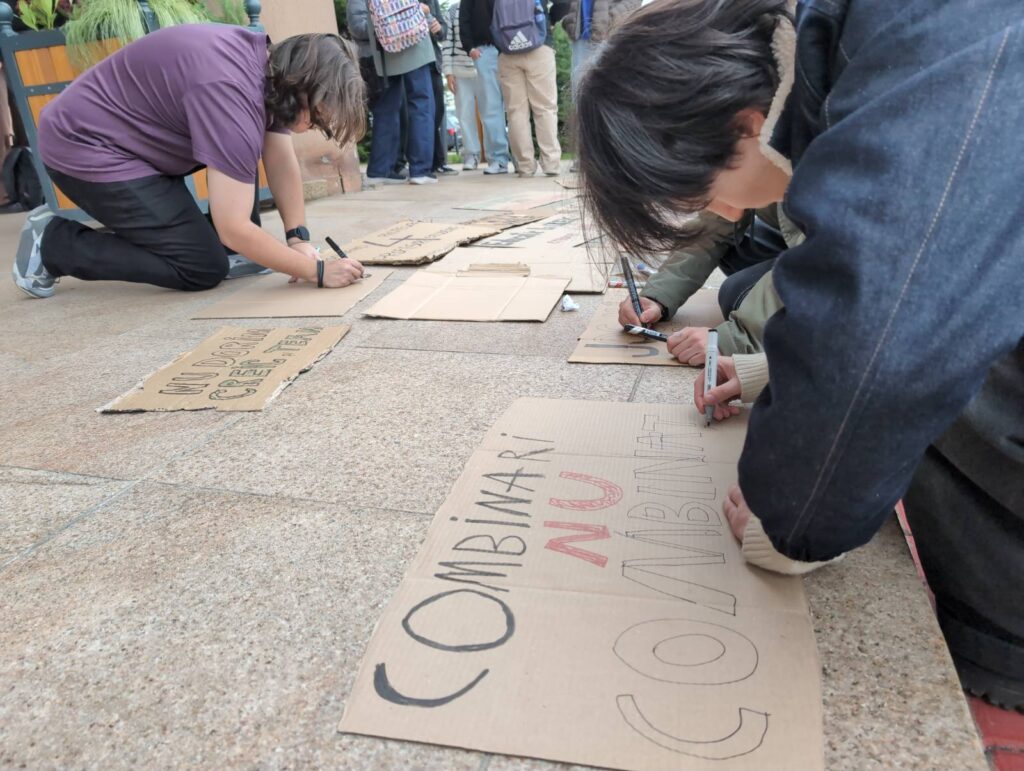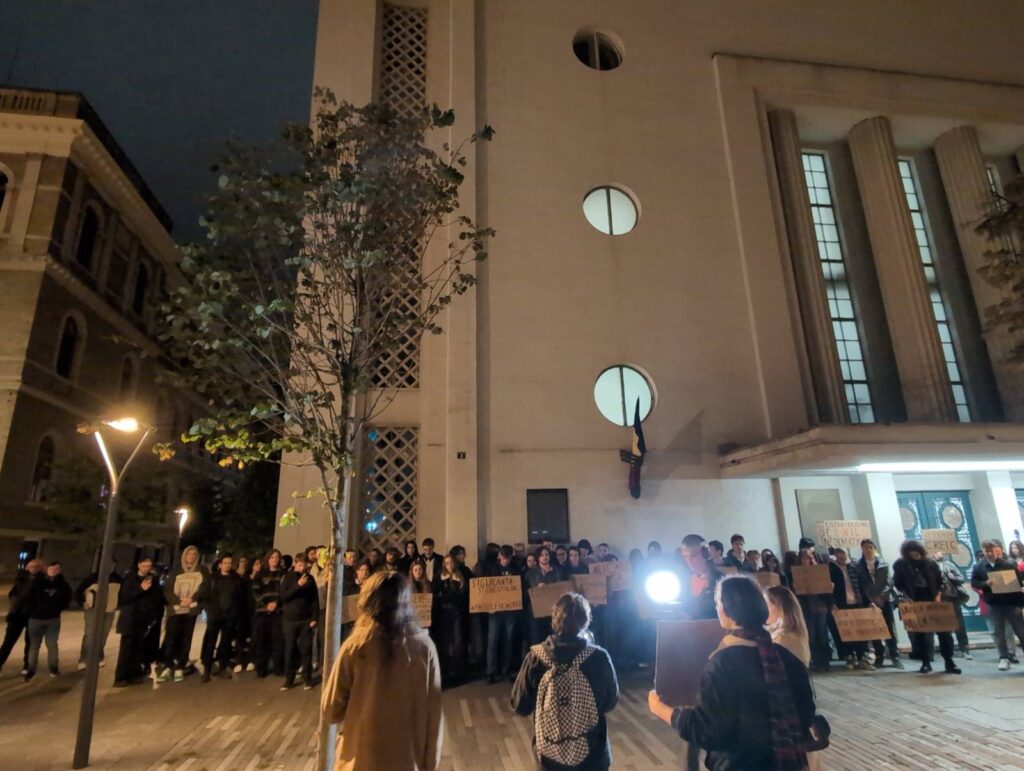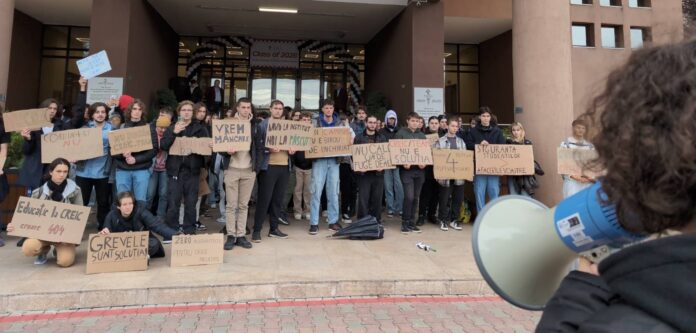article by Simina Seliștean, Mihnea Teodor Popescu
For students in Romania and Cluj-Napoca, the start of the academic year brought a series of bad news. The austerity imposed by Bolojan’s right-wing government has impacted the number and amount of social and academic scholarships, in the context of rising VAT and living costs, and access to rail transport has been restricted. The singular protest of the main student federation, ANOSR, organized for a single day concurrently with the opening festivities, was not enough to de-escalate the situation.
In addition to this, students of the Faculty of Mathematics and Informatics at Babeș-Bolyai University (UBB) in Cluj-Napoca had another unpleasant surprise: they found that their faculty was being relocated to a hill outside the city, in a third-party building called the Regional Center of Excellence for Creative Industries (CREIC). This was the last straw.
What is the problem with CREIC?
CREIC is a building owned and managed by the municipality through the company Cluj Innovation Park SA, established in 2014, where the municipality is the sole shareholder. The building was constructed with public money, mainly European funds, and remained unoccupied for almost 3 years after its completion. Even afterwards, a large part of its spaces remained vacant due to its isolated and unsuitable location. Alongside it, Cluj Innovation Park also includes the TEAM building, which is in a similar situation.
In this context, to justify the investment of public money, UBB rented 15-17% of each of the two buildings for a price of over 22,000 EUR per month. Citing a lack of its own spaces for holding classes, the university intended to build a campus outside the city – initially by relocating the Faculty of Mathematics and Informatics (FMI) there, with other faculties such as Biology or Chemistry scheduled to follow.
It quickly became apparent that the CREIC and TEAM buildings are fundamentally unsuitable for conducting university courses. Initially designed as office spaces, the buildings could at best offer improvised classrooms, often without enough power sockets or visibility of the blackboard, and had problems such as defective elevators, non-functional sanitary facilities, and missing floor tiles. The location on the outskirts of the city means that a student’s round trip can take up to 3 hours a day and involves risks in case of a medical emergency. The lack of essential facilities such as a canteen or nearby shops makes attending classes, especially in the evening, extremely difficult and risky for students. Even if all these problems were solved, the real risk that makes the spaces incompatible is related to the identified geo-technical risk: in fact, Lomb Hill is an area with active landslides. Moreover, an investigation has shown that CREIC and TEAM do not have a fire safety permit for educational institutions.
This entire move occurred in the context of the Faculty of Law having recently been relocated to a new space, and the former Law building being appropriated by a research institute that the former rector of UBB and current Minister of Education, Daniel David, created to appoint himself as its head—although the vacant Law building could have theoretically been given to the students and professors of Mathematics and Informatics. In this context, the first week of the academic year brought widespread dissatisfaction among the FMI students, who were seeking forms of collective action against the move.

Boycott, the Path to Victory
The idea of a student strike, called a “boycott,” was circulating in the air and on student communication groups. We intervened through the Cluj-Napoca Students’ Committee (CSC) to centralize and publicly announce support for the initiative, as well as to carry out leafleting actions among students and manage press relations. At the same time, we called for an ad-hoc student meeting in the space provided by the local pre-university teachers’ union (SLIPC), where we explained the strategy, managed fears of risks, and planned the escalation into a spontaneous protest a few days later. The protest took place during a first meeting of the FMI Council.
Existing student organizations were reluctant to adopt the boycott idea, placing themselves at the tail end of the spontaneous movement. The Students’ Council (subservient to the UBB administration), which had previously voted by a majority for the move to CREIC and TEAM, had divided opinions, with some individuals joining in their own name but without expressly encouraging the boycott. The UBB Students’ Organization (OSUBB), the most powerful student organization in the university, organized a separate protest one day after the spontaneous one we took part in. The OSUBB protest was intended to function more as a PR scheme for the faculty’s dean, but it was compromised when unaffiliated students spontaneously started using the boycott as a slogan.
According to the university administration’s estimates, over 80% of FMI students boycotted the classes in CREIC and TEAM. Several professors sent messages of solidarity but could not publicly assume their opposition due to intimidation from the leadership. The anti-CREIC movement enjoyed increased visibility in the local and national press—because we are talking about, perhaps, the first spontaneous student strike in Cluj’s recent history, but also due to the contribution of the “self-suspended rector of UBB,” i.e., the current minister Daniel David, to the problem.
On October 11, 2025, Minister David was in Cluj-Napoca to participate in a debate about the underfunding of education (which he himself implemented as part of the current right-wing government) following a theater performance. The anti-CREIC student movement and the Cluj-Napoca Students’ Committee targeted the conference with a spontaneous protest at the institution’s door—where we requested that the minister come out to talk to the protesters. He refused dialogue in an uncontrolled space and barricaded himself in the building, from which he did not emerge until after 11:00 PM, the time until which we waited for him. Instead, the protest represented a powerful blow to the minister’s public and media image.
Following the escalation of tensions and the ongoing boycott, in a meeting of the FMI Council on October 17, 2025, a vote was cast against holding teaching activities in CREIC and TEAM, as well as for canceling the campus construction project on Lomb Hill. The faculty announced that measures were being taken for the gradual relocation of classes back to the city.
To date, some of the classes from CREIC and TEAM have been moved or switched to an online or hybrid format, but some FMI students still have to be physically present for some classes on Lomb Hill. This is a victory, albeit a partial one—but we cannot afford not to be vigilant. The Mathematics and Informatics Students’ Committee (CSMI), an independent group formed in the wake of the struggle, continues to advocate for moving all classes from CREIC and TEAM online, for accelerating the move, and urges all students to avoid traveling to Lomb Hill for safety reasons.

An Earthquake for the Controlled Student Opposition
This victory was a powerful signal to all students in Cluj and across Romania—a demonstration that you can organize alongside your peers to win your rights and oppose the bureaucratic decisions of university leadership, without waiting for existing structures if they are unwilling to take up the fight. The partial victory in Cluj has already fueled other student movements in other universities:
In Brașov, students organized spontaneous protests against the decision of Transilvania University (UNITBV) to make attendance mandatory in inadequate and overcrowded classrooms, given that most students are forced to work to support themselves. The contemptuous reaction of Rector Abrudan fueled the continuation of the protests.
In Bucharest, at the National University of Theatre and Film Arts (UNATC), students organized a spontaneous protest titled “Boycott,” demanding that the University respect its contractual obligations. A notable demand is to have free access to classrooms until 12:00 PM, without depending on requests—as an explicit claim to university space.
The spontaneous demonstrations by students are a cause for concern for universities, the government, and student federations alike. University administrations know it is difficult to impose compromises on spontaneous groups that do not orient themselves by the arbitrary decisions of co-optable leaders. The government, especially with the UBB rector being part of it, knows that student pressure can join union pressure, becoming much harder to pacify, and fears such solidarity. The student federations and institutionalized organizations, always ready to make compromises for positions or resources, have realized that the times when their stances and actions kept student activism in a straitjacket are coming to an end, which is why their leadership is doing everything possible to delegitimize spontaneously organized groups like the CSC. In fact, the organizations OSUBB, CSUBB, and KMDSZ claimed the victory against the Lomb campus, stating that it came as a result of their pressure—not at all as a collective effort of all the students who boycotted and took to the streets.
Within the Faculty of Mathematics and Informatics, the partial victory of the anti-CREIC movement has politicized the elections for positions in the Students’ Council for the first time. Positions that were previously filled by the only person who took on the task, with the vote of a minority of students, are now being contested by multiple candidates, with debates being planned. However, as a victory for a student active in the CSC and the anti-CREIC movement was possible and realistic, his candidacy was invalidated on bureaucratic grounds—specifically, a missing declaration from the application file, which our candidate was not given the option to re-upload. In parallel, some students with positions in the Senate and some members of organizations like OSUBB have launched numerous accusations of “political extremism” against the CSC and independently organized students in Cluj, informing university leadership and the police of their suspicions. The UBB Rector insisted he would only talk to the “legitimate” representatives of the students, not those who are ideologically motivated.
However, the abusive invalidation of the candidacy file led to a wave of reactions and dissatisfaction from students, which resulted in the resignation of the former head of the commission and student senator; in a message, he accused that he had been “denigrated.” Following the resignation, the elections for the Students’ Council will be restarted from scratch, with the CSC group firmly positioning itself behind the only candidate with a central role in the victory against the Lomb campus.

What’s next?
Although the campus on the hilltop might not materialize (at least not in the very near future), students in Romania still have their scholarships cut, their free rail transport canceled, and must operate in overcrowded and poor-condition dorms and classrooms. Students are still seen by the system only as a future highly-trained and easily exploitable workforce due to their lack of experience, and education will always be, under capitalism, just an annex of the labor market. The current government continues to adopt austerity and anti-social measures while redirecting money into armaments.To change this, it is necessary, among other things, to make permanent and generalize the student revolt from Cluj, Bucharest, Brașov, and the entire country. It is necessary to build independent committees and democratic forms of organization outside of compromised structures, and it is necessary for students, teachers, and employees in education and all sectors to fight and organize together against austerity and for a system where the needs of those who work are determinant for society, not the profit imperative. Only in this way can the lesson from Cluj be properly capitalized upon. If the students of Cluj can win the fight in order not to move to the hill, students everywhere can fight against the system and strike blows to it.



